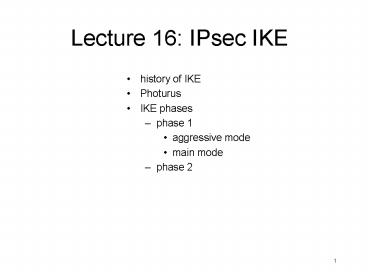Lecture 16: IPsec IKE - PowerPoint PPT Presentation
1 / 9
Title:
Lecture 16: IPsec IKE
Description:
Early contenders: Photuris: Authenticated D-H with cookies & identity hiding. SKIP: Auth. D-H with long-term public exponents known to the other party. ISAKMP: ... – PowerPoint PPT presentation
Number of Views:50
Avg rating:3.0/5.0
Title: Lecture 16: IPsec IKE
1
Lecture 16 IPsec IKE
- history of IKE
- Photurus
- IKE phases
- phase 1
- aggressive mode
- main mode
- phase 2
2
History of IKE
- Early contenders
- Photuris Authenticated D-H with cookies
identity hiding - SKIP Auth. D-H with long-term public exponents
known to the other party - ISAKMP
- a protocol specifying only payload formats
exchanges (i.e., an empty protocol) - adopted by the IPsec working group
- Oakley modified Photuris can work with ISAKMP
- IKE a particular Oakley-ISAKMP combination
3
Photuris
CA
CA,CB, crypto offered
CA,CB, ga mod p, crypto selected
Alice
Bob
CA,CB, gb mod p
(K gab mod p)
CA,CB, KAlice, signature on previous messages
CA,CB, KBob, signature on previous messages
- CA Alices cookie for connection
identification (in case she initiates multiple
connections to Bob) - CB Bobs cookie, stateless against DoS (why?)
4
IKE/ISAKMP Phases
- Phase 1
- does authenticated D-H, establishes session key
ISAKMP SA or IKE SA (security association,
whats that again?) - two possible modes Main Aggressive
- two keys are derived from the session
keySKEYID_e to encrypt Phase 2
messagesSKEYID_a to authenticate Phase 2
messages - Phase 2
- IPsec (AH or ESP) SA established messages
encrypted authenticated with Phase 1 keys - optional additional D-H exchange for PFS
- why two phases?
- ISAKMP may possibly used for other things besides
IPsec - may have different conversations on top of same
phase 1 (with different security characteristics) - key rollover is easier on phase 2 rather than
repeating phase 1
5
Phase 1 Modes
- two possible modes
- main mode 6 rounds provides identity hiding
- aggressive mode 3 rounds
- types of authentication
- MAC with pre-shared secret key
- digital signatures
- public key encryption
- original all public key encryption
- revised public secret key encryption
6
Phase 1 Aggressive Mode
ga mod p, Alice, crypto offered
gb mod p, crypto selected, proof Im Bob
Alice
Bob
proof Im Alice
- previous messages are used to compose the proof,
what else? - one problem if Bob does not support any of the
Alices crypto choices it just has to terminate
the connection without informing Alice (why?)
7
Phase 1 Main Mode
crypto offered
crypto selected
ga mod p
Alice
Bob
gb mod p
(K gab mod p)
KAlice, proof Im Alice
KBob, proof Im Bob
8
Phase 1 Issues
- crypto parameters
- Alice presents all algorithm combinations she can
support may be too costly what if she
supports any combination - proof of identity
- certain fields of the previous messages are
hashed signed/encrypted in the final rounds - not included Bobs accepted parameters
(problematic) - cookies
- similar to Photuris cookies
- yet cookies include the crypto parameters Alice
offered, Bob is no longer stateless (why? why is
this a problem?)
9
Phase 2
Phase1 SA
X, Y, CP, SPIA, nonceA, traffic, ga mod p
Alice
Bob
X, Y, CPA, SPIB, nonceB, traffic, gb mod p
X, Y, ack
- X pair of cookies generated in Phase 1Y
session identifier within Phase 1 (could be
multiple sessions) - each message is encrypted/authenticated with
Phase 1 keys - traffic optional description of acceptable
traffic - key generation based on Phase 1 key, SPI,
nonces - whats SPI (security parameter index)?































